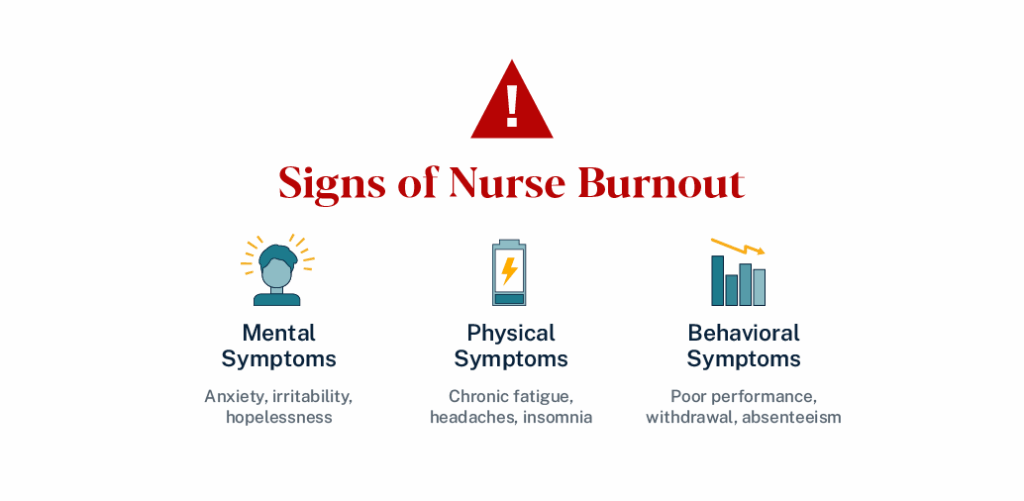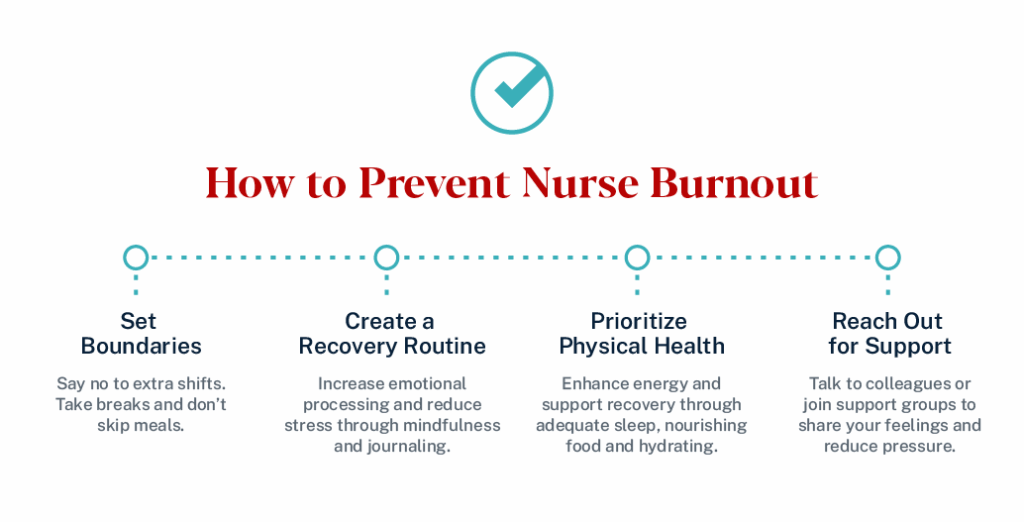
For nursing professionals and healthcare workers, burnout is more than just a buzzword. In recent times, particularly following the COVID-19 pandemic, nurses nationwide have encountered increasing demands, persistent understaffing and significant emotional fatigue.
According to a recent survey by the National Council of State Boards of Nursing, 100,000 registered nurses (RNs) left their jobs during the pandemic, and more than 610,000 indicated an intent to leave by 2027. The result? Rising burnout rates, declining mental health and a growing number of nurses leaving the profession altogether.
But burnout isn’t just bad for nurses — it’s bad for patients, too. Exhausted, emotionally drained staff are more likely to make medical errors, struggle with empathy and ultimately leave the healthcare field, leading to even greater staffing shortages and lower quality of care.
The good news: Burnout is preventable through awareness, early intervention and structural change. Whether you’re a seasoned veteran, an administrator or a student in an RN program, understanding this issue is the first step to creating a more sustainable, compassionate future for nursing.
This blog will explore what nursing burnout really looks like, how to recognize the warning signs and most importantly, how nurses and healthcare organizations can work together to prevent it. The following tips and resources will help you reduce burnout and navigate your way to improved job satisfaction and better mental health.
What Is Nurse Burnout?
Nurse burnout extends beyond just feeling tired after a long shift. Burnout is a chronic condition that builds up over time, and it often goes unnoticed until it begins to affect every part of a stressed nurse’s life. The risk for burnout in nursing is real, but it is also preventable. Burnout is defined by the World Health Organization as a result of “chronic workplace stress that has not been successfully managed,” and is especially common in high-stress, emotionally demanding fields like nursing and public health.
Recognizing the signs early is essential. Burnout isn’t a personal failure; it’s a warning signal that something in your work environment or workload needs to change. The sooner you address it, the better your chances are for recovery and long-term well-being.
Nurse Burnout Symptoms
Burnout symptoms can look like stress, but they are a deeper, more persistent state — unlike temporary stress, which may pass after a few days off or a good night’s sleep. It can lead to physical illness, emotional breakdowns or a desire to leave the profession altogether.
At its core, burnout is characterized by three main symptoms:
- Emotional exhaustion: Feeling drained, overwhelmed or mentally depleted day after day
- Depersonalization: Detachment or numbness to patients and coworkers to cope with ongoing stress
- Reduced sense of personal accomplishment: Feeling ineffective or like your work doesn’t matter, even when you’re doing your best
These symptoms often stem from the unique stress in nursing: caring for critically ill patients, navigating understaffed units, dealing with trauma and loss, and managing fast-paced decision-making under pressure. When these stressors pile up without adequate support or recovery time, burnout can take root.
Are you a burnt-out nurse? Here are some signs to watch for:
- Physical symptoms can include things like chronic fatigue, headaches, insomnia and frequent illness.
- Emotional and mental symptoms may look like increased anxiety and irritability, feeling helpless, hopeless, or trapped, detachment from patients or work.
- Behavioral signs can look like a decline in work performance, withdrawal from coworkers and increased absenteeism.

Causes of Nurse Burnout
Burnout doesn’t happen overnight. It builds slowly, caused by a combination of systemic pressures and emotional demands. While every nurse’s experience is unique, several recurring factors contribute to burnout across healthcare environments:
Understaffing and long shifts: One of the biggest causes of burnout is working too much with too few resources. RN burnout stems from nurses being frequently asked to cover extra shifts, manage high patient-to-nurse ratios and multitask beyond their training. This results in physical exhaustion and an inability to provide the level of care they know patients deserve.
Emotional stress of patient care: Nursing is an emotionally intense profession. Nurses often support patients through trauma, suffering and death — sometimes without time to process their own feelings. Over time, this unresolved emotional weight can lead to compassion fatigue and emotional numbness.
Lack of management, peer support: Feeling isolated or unheard by leadership only makes matters worse. When you don’t feel supported, respected or valued by supervisors or colleagues, you’re more likely to disengage from your work — and eventually from the nursing profession itself.
Struggles with work-life balance: Rotating shifts, mandatory overtime and on-call responsibilities make it hard for nurses to maintain a stable routine. When there’s no time for family, rest or personal growth, burnout can creep in.
Burnout isn’t just about being overworked but also working under unsustainable conditions that are emotionally depleting. Understanding these root causes is the first step toward changing them, both for yourself and your workplace.
Burnout in Nursing School
Many nurses choose to pursue additional certification and continuing education while on the job, which can also exacerbate burnout. But even the most resilient students can hit a wall – juggling work, school and the rest of life is no easy feat. By juggling so much, RN burnout is a real danger.
Here are ways that nurses can mitigate burnout when they are in school:
- Maintain priorities outside of work. Keep whatever is most important in your life number one. Whether it’s your family, job, church or social life, hang on to what brings you the most joy and don’t allow school to negate it. If you do, you’ll begin to resent it. Furthering your education is a positive addition to your life – don’t allow it to become a storm cloud that takes over everything else.
- Learn to say no. Set healthy boundaries with relationships and activities that demand an unnecessary amount of your time. Review your calendar regularly: What can you skip? Where can you shift time to your top priorities?
- Plan your week. Avoiding burnout means keeping school from bleeding into every hour of the day. Schedule your school time the way you would any other appointment. If you set aside 8-11 am to work on school assignments, then stop and switch gears promptly at 11:01 am. Schedule in time off so you have sufficient brain breaks!
- Ask for help. It can be scary to raise your voice and ask a question when you don’t understand something. When you find yourself struggling over coursework, don’t hesitate to reach out to your instructors. Ask your peers or coworkers if they’re interested in forming a study group. Even meeting remotely can be beneficial and supportive in building great study habits.
- When you’re pulled in too many directions, even the smallest things seem impossible to accomplish. Nursing school burnout is challenging, but these steps can help avoid the worst. Nurses should take time to reset priorities and refocus. It is possible to juggle school, work and life at the same time, even when it feels overwhelming.
Why Healthcare Burnout Matters for Nurses
Burnout doesn’t stop at the nurse’s station. It affects our entire healthcare system, patient outcomes and the sustainability of the profession. When nurses are overworked and emotionally depleted, the impact ripples far beyond individuals. Burnout takes a significant toll on our physical and mental health.
Chronic stress has been linked to:
- Anxiety and depression
- Insomnia and fatigue
- Cardiovascular issues
- Substance use and unhealthy coping mechanisms
Burnt-out nurses also report lower job satisfaction, feelings of detachment from patients and a decreased sense of purpose. Over time, this can lead to career abandonment, which is a growing concern as healthcare faces nationwide nursing shortages.
Patients: How does burnout impact patient care? When nurses are exhausted or emotionally withdrawn, the quality of care suffers. Burnout has been associated with:
- Increased medical errors
- Lower patient satisfaction scores
- Poorer communication between care teams
In high-stakes environments like the ICU and emergency departments, even small mistakes can have life-altering consequences.
Healthcare Systems: Burnout is bad for business, plain and simple. It imposes a financial and operational burden — high turnover rates, absenteeism and decreased productivity cost hospitals millions each year. Training new nurses and managing frequent staffing gaps adds pressure to already strained systems. Investing in burnout prevention is cost-effective and compassionate.
Recognizing burnout as a systemic issue rather than a personal failing is the first step toward meaningful change for individuals and institutions alike.
How to Prevent Nursing Burnout
Systemic solutions are an essential component of combating burnout, but individual nurses can also take steps to protect their well-being. Burnt-out nurses can’t provide the excellent patient care they’re normally capable of, and reducing burnout requires both proactive habits and permission to prioritize your own health.
Set Boundaries With Work
- Say no when you need to: You don’t have to pick up every extra shift.
- Take your breaks: Skipping meals or rest time doesn’t make you a better nurse — it makes you more vulnerable to burnout.
- Leave work at work: Avoid checking messages or charting after hours when possible.
Create a Recovery Routine
- Practice mindfulness: Even five to ten minutes of deep breathing or meditation during a break can reset your nervous system.
- Reflect through journaling: Processing emotional experiences outside of the clinical setting helps release stress.
- Create small rituals: Listening to music during your commute or stretching before bed can help signal to your body that the shift is over.
Prioritize Physical Health
- Get enough sleep: Lack of rest makes emotional and physical stress worse.
- Fuel your body: Choose nourishing food that energizes and hydrates you throughout the day.
- Stay active: Gentle movement, like walking or yoga, can reduce stress and support recovery.
Reach Out for Support
- Talk to someone: Whether it’s a colleague, therapist or friend, sharing your feelings helps release internal pressure.
- Join peer support programs: Many hospitals now offer confidential groups for nurses.
- Speak up at work: Advocate for changes that would reduce stress, such as shift adjustments or mental health resources.

Creating a Healthy Work Culture
Individual self-care is important, but it’s not enough to prevent or reverse burnout on its own. Effective change includes collaborative efforts between leaders, healthcare workers and policymakers. Healthcare leaders play a critical role in shaping the work environment, setting the tone for a culture that either fuels burnout or helps nurses thrive.
Some places to start include:
- Improved scheduling: Nurse burnout can be accounted for and prevented by including nursing staff and healthcare workers in the process.
- Prioritize mental health: Employee assistance programs, trauma counseling and peer support groups in the workplace can all provide emotional resources for burnt-out nurses.
- Respect and recognition: Celebrating nursing professionals’ achievements and acknowledging their hard work goes a long way in fostering a healthy, sustainable work community.
If you’re a nurse, know that your health matters as much as your patients’ — you can’t pour from an empty cup. Taking care of yourself is critical for your ability to care for others. Preventing burnout begins with recognizing the signs and responding with action.
Nurses can reclaim their well-being by setting boundaries, building daily recovery practices and seeking connection. Healthcare leaders and administrators can lead the charge by championing sustainable systems that support healthy work-life balances.
Advance your nursing career through fully online programs that fit seamlessly within your busy schedule. Explore the nursing programs offered at American College of Education.

